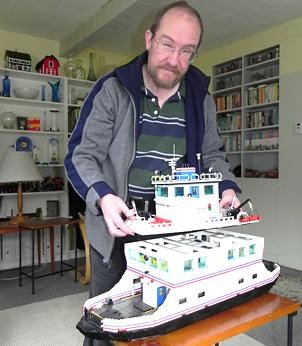Kevin Wilson is an organizer. He sees things clearly and co-ordinates his many activities with admirable determination. He has several online businesses and makes time for community projects, joining clubs and often initiating groups himself.
In 2009 Wilson read a library book: The Transition Handbook by Bob Hopkins. After reading it he saw the world differently. The book identified issues he had observed himself, and it made connections between them that he hadn’t noticed before. “Once you’ve connected the dots…you can’t close Pandora’s box,” Wilson says.
The Transition Town initiative is a response to the concept of “peak oil” that is the point in time when the global oil extraction reaches its maximum and begins to decline. Transition Towns around the world are preparing for life with fewer and more expensive energy resources.
Wilson predicts that the three most influential forces in the next decades will be peak oil, climate change and economic instability, but he is optimistic about adapting survival strategies.
The solutions will come from three levels: government, individuals and small groups. “The idea that an individual will survive in a bunker hoarding food is not sustainable,” he maintains, believing a prepared community will be the strongest.
Transition Town Powell River began with a number of awareness meetings, with movies and discussion around elements of the inevitable and eventual transition. Getting people used to new systems of travelling, eating and commercial business will make transition more orderly and easier.
Local food supply is a key area, and because there is lots of activity around Powell River in this already, Transition Town has focused on other initiatives: alternative transportation, car-sharing, an alternative building tour and local money.
Wilson organized a three-day local economy event in September, 2011. From that event grew the Powell River Money Society, a group promoting a Powell River currency, money that would not leave town. The group plans a test phase for the currency in July, 2012.
Wilson grew up in Kent, England. The concepts of thrift and home gardens were part of his upbringing. His mother managed her own vegetable garden, her neighbour’s garden and an allotment. “I don’t consciously remember when or how I learned about gardening. I just know how to do things,” Wilson muses.
His partner, Alfred Bolster, also grew up with a gardener mother, and sometimes there is a “battle of the mom’s methods” in their garden.
Market gardening was Wilson’s plan when he first moved to Powell River in 2003. However, he found that growing is the easy part and that preparation for market and sales were too time-consuming on a small scale. He and Bolster appreciate the variety of vegetable markets around town to supplement vegetables from their productive hoop-house and beds. Wilson is taking part in an intensive permaculture course offered at St. David and St. Paul Anglican Church this season.
The couple is also part of a drop-in knitting group. Wilson enjoyed re-learning how to knit and continues to expand his repertoire.
Despite belonging to multiple community groups, Wilson identifies as an introvert, one who gains energy from “alone time.”
He taught himself computers in 1983, shortly after coming to Canada, and spent 15 years as a computer consultant and designing custom software. When he developed carpel tunnel syndrome he had to stop designing software and he took up another solitary and creative activity: designing LegoTM models. He sells kits and plans for his designs to adult LegoTM fans around the world through his website www.lionsgatemodels.com. Wilson’s imaginative buildings and vehicles are admired for their details, like the shelves and bottles in a medieval apothecary shop and the fire extinguisher and axe on a model of the Bowen Island ferry.
Wilson is the author of several e-books about small business marketing and kitchen design.
This mosaic of activities keeps Wilson busy every day. “Sometimes it is too much,” he admits. “I try not to do all of them in one day. But I have always been this way. I increase the number of things I do and then I cut back on them.”



